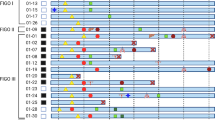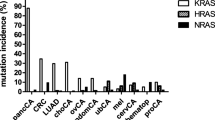Abstract
Background: Colorectal cancers resulting from defective DNA mismatch repair can occur in both hereditary non-polyposis colon cancer (HNPCC) and in the sporadic setting. They are characterised by a high level of microsatellite instability (MSI-H) and superficially resemble each other in that they are frequently located in the proximal colon and share features such as circumscribed tumour margins and tumour-infiltrating lymphocytes. However, significant differences can be demonstrated at the molecular level including widespread promoter hypermethylation and BRAF-activating mutations which occur significantly less often in HNPCC. Aims: In this study, we sought to determine whether the presence of widespread promoter hypermethylation and BRAF mutations would exclude HNPCC. Materials and methods: We investigated the methylation status of four methylated in tumour markers (MINTs 1,2,12 and 31), and the promoter regions of 5 genes hMLH1, HPP1, MGMT, p16 INK4A and p14 ARF, in 21 sporadic MSI-H colorectal cancers and compared these with 18 cancers from HNPCC patients. The methylation status of CpG islands were determined by either methylation specific PCR (MSP) or combined bisulfite restricton analysis (COBRA). In addition we considered the BRAF mutation status of 18 HNPCC tumours and 19 sporadic MSI-H cancers which had been previously determined by RFLP analysis and confirmatory sequencing. Results: Methylation of the promoter regions in target genes occurred less frequently within the HNPCC tumours (27% of analyses), compared with the sporadic MSI-H tumours (59% of analyses)(P < 0.001). Methylation of MINTs 1, 2, 12 and 31 occurred in 4% of analyses for HNPCC tumours contrasted with 73% for sporadic MSI-H tumours (P < 0.001). BRAF mutations were detected in 74% of sporadic tumours but none of the HNPCC cancers tested. Conclusions: The total number of genes and MINTs methylated in HNPCC was lower than in MSI-H colorectal tumours. No HNPCC tumour showed evidence of widespread promoter hypermethylation or BRAF mutation suggesting this feature could be used as a discriminator between familial and sporadic cases.
Similar content being viewed by others
References
Jass JR, Biden KG, Cummings MC et al. Characterisation of a subtype of colorectal cancer combining features of the suppressor and mild mutator pathways. J Clin Pathol 1999; 52(6): 455–60.
Thibodeau SN, Bren G, Schaid D. Microsatellite instability in cancer of the proximal colon. Science 1993; 260(5109): 816–9.
Ionov Y, Peinado MA, Malkhosyan S et al. Ubiquitous somatic mutations in simple repeated sequences reveal a new mechanism for colonic carcinogenesis. Nature 1993; 363(6429): 558–61.
Mecklin JP, Jarvinen HJ, Hakkiluoto A et al. Frequency of hereditary nonpolyposis colorectal cancer. A prospective multicenter study in Finland. Dis Colon Rectum 1995; 38(6): 588–93.
Peel DJ, Ziogas A, Fox EA et al. Characterization of hereditary nonpolyposis colorectal cancer families from a population-based series of cases. J Natl Cancer Inst 2000; 92(18): 1517–22.
Jass JR, Do KA, Simms LA et al. Morphology of sporadic colorectal cancer with DNA replication errors. Gut 1998; 42(5): 673–9.
Kane MF, Loda M, Gaida GM et al. Methylation of the hhMLH1 promoter correlates with lack of expression of hhMLH1 in sporadic colon tumors and mismatch repair-defective human tumor cell lines. Cancer Res 1997; 57(5): 808–11.
Jass JR, Walsh MD, Barker M et al. Distinction between familial and sporadic forms of colorectal cancer showing DNA microsatellite instability. Eur J Cancer 2002; 38(7): 858–66.
Young J, Simms LA, Biden KG et al. Features of colorectal cancers with high-level microsatellite instability occurring in familial and sporadic settings: Parallel pathways of tumorigenesis. Am J Pathol 2001; 159(6): 2107–16.
Iino H, Simms L, Young J et al. DNA microsatellite instability and mismatch repair protein loss in adenomas presenting in hereditary non-polyposis colorectal cancer. Gut 2000; 47(1): 37–42.
Hawkins NJ, Ward RL. Sporadic colorectal cancers with microsatellite instability and their possible origin in hyperplastic polyps and serrated adenomas. J Natl Cancer Inst 2001; 93(17): 1307–13.
Toyota M, Ahuja N, Ohe-Toyota M et al. CpG island methylator phenotype in colorectal cancer. Proc Natl Acad Sci USA 1999; 96(15): 8681–6.
Whitehall VL, Wynter CV, Walsh MD et al. Morphological and molecular heterogeneity within nonmicrosatellite instability-high colorectal cancer. Cancer Res 2002; 62(21): 6011–4.
Potocnik U, Glavac D, Golouh R, Ravnik-Glavac M. Causes of microsatellite instability in colorectal tumors: Implications for hereditary non-polyposis colorectal cancer screening. Cancer Genet Cytogenet 2001; 126(2): 85–96.
Herman JG, Umar A, Polyak K et al. Incidence and functional consequences of hhMLH1 promoter hypermethylation in colorectal carcinoma. Proc Natl Acad Sci USA 1998; 95(12): 6870–5.
Rajagopalan H, Bardelli A, Lengauer C et al. Tumorigenesis: RAF/RAS oncogenes and mismatch-repair status. Nature 2002; 418(6901): 934.
Domingo E, Espin E, Armengol M et al. Activated BRAF targets proximal colon tumors with mismatch repair deficiency and hMLH1 inactivation. Genes Chromosomes Cancer 2004; 39(2): 138–42.
Wang L, Cunningham JM, Winters JL et al. BRAF mutations in colon cancer are not likely attributable to defective DNA mismatch repair. Cancer Res 2003; 63(17): 5209–12.
Koinuma K, Shitoh K, Miyakura Y et al. Mutations of BRAF are associated with extensive hhMLH1 promoter methylation in sporadic colorectal carcinomas. Int J Cancer 2004; 108(2): 237–42.
Young J, Biden KG, Simms LA et al. HPP1: a transmembrane protein-encoding gene commonly methylated in colorectal polyps and cancers. Proc Natl Acad Sci USA 2001; 98(1): 265–70.
Esteller M, Hamilton SR, Burger PC et al. Inactivation of the DNA repair gene O6-methylguanine-DNA methyltransferase by promoter hypermethylation is a common event in primary human neoplasia. Cancer Res 1999; 59(4): 793–7.
Ahuja N, Mohan AL, Li Q et al. Association between CpG island methylation and microsatellite instability in colorectal cancer. Cancer Res 1997; 57(16): 3370–4.
Esteller M, Tortola S, Toyota M, et al. Hypermethylationassociated inactivation of p14(ARF) is independent of p16(INK4a) methylation and p53 mutational status. Cancer Res 2000; 60(1): 129–33.
Vasen HF, Watson P, Mecklin JP, Lynch HT. New clinical criteria for hereditary nonpolyposis colorectal cancer (HNPCC, Lynch syndrome) proposed by the International Collaborative group on HNPCC. Gastroenterology 1999; 116(6): 1453–6.
Rodriguez-Bigas MA, Boland CR, Hamilton SR et al. A National Cancer Institute workshop on hereditary nonpolyposis colorectal cancer syndrome: meeting highlights and Bethesda guidelines. J Natl Cancer Inst 1997; 89(23): 1758–62.
Herman JG, Graff JR, Myohanen S et al. Methylation-specific PCR: a novel PCR assay for methylation status of CpG islands. Proc Natl Acad Sci USA 1996; 93(18): 9821–6.
Esteller M, Risques RA, Toyota M et al. Promoter hypermethylation of the DNA repair gene O(6)-methylguanine-DNA methyltransferase is associated with the presence of G:C to A:T transition mutations in p53 in human colorectal tumorigenesis. Cancer Res 2001; 61(12): 4689–92.
Xiong Z, Laird PW. COBRA: A sensitive and quantitative DNA methylation assay. Nucleic Acids Res 1997; 25(12): 2532–4.
Toyota M, Ho C, Ahuja N et al. Identification of differentially methylated sequences in colorectal cancer by methylated CpG island amplification. Cancer Res 1999; 59(10): 2307–12.
Toyota M, Issa JP. CpG island methylator phenotypes in aging and cancer. Semin Cancer Biol 1999; 9(5): 349–57.
Ahuja N, Li Q, Mohan AL et al. Aging and DNA methylation in colorectal mucosa and cancer. Cancer Res 1998; 58(23): 5489–94.
Bronner CE, Baker SM, Morrison PT et al. Mutation in the DNA mismatch repair gene homologue hhMLH1 is associated with hereditary non-polyposis colon cancer. Nature 1994; 368(6468): 258–61.
Papadopoulos N, Nicolaides NC, Wei YF et al. Mutation of a mutL homolog in hereditary colon cancer. Science 1994; 263(5153): 1625–9.
Kuismanen SA, Holmberg MT, Salovaara R et al. Epigenetic phenotypes distinguish microsatellite-stable and-unstable colorectal cancers. Proc Natl Acad Sci USA 1999; 96(22): 12661–6.
Wheeler JM, Loukola A, Aaltonen LA et al. The role of hypermethylation of the hhMLH1promoter region inHNPCCversusMSI+ sporadic colorectal cancers. J Med Genet 2000; 37(8): 588–92.
Cunningham JM, Christensen ER, Tester DJ et al. Hypermethylation of the hhMLH1 promoter in colon cancer with microsatellite instability. Cancer Res 1998; 58(15): 3455–60.
Yamamoto H, Min Y, Itoh F, et al. Differential involvement of the hypermethylator phenotype in hereditary and sporadic colorectal cancers with high-frequency microsatellite instability. Genes Chromosomes Cancer 2002; 33(3): 322–5.
Kuismanen SA, Holmberg MT, Salovaara R et al. Genetic and epigenetic modification of hMLH1 accounts for a major share of microsatellite-unstable colorectal cancers. Am J Pathol 2000; 156(5): 1773–9.
Menigatti M, Di Gregorio C, Borghi F et al. Methylation pattern of different regions of the hMLH1 promoter and silencing of gene expression in hereditary and sporadic colorectal cancer. Genes Chromosomes Cancer 2001; 31(4): 357–61.
Deng G, Peng E, Gum J, Terdiman J et al. Methylation of hhMLH1 promoter correlates with the gene silencing with a region-specific manner in colorectal cancer. Br J Cancer 2002; 86(4): 574–9.
Shitoh K, Konishi F, Masubuchi S et al. Important microsatellite markers in the investigation of replication errors (RER) in colorectal carcinomas. Jpn J Clin Oncol 1998; 28(9): 538–41.
Frazier ML, Sinicrope FA, Amos CI et al. Loci for efficient detection of microsatellite instability in hereditary non-polyposis colorectal cancer. Oncol Rep 1999; 6(3): 497–505.
Whitehall V, Jass J, Walsh M et al. Methylation of 0-6-methylguanine DNA methyltransferase characterises a subset of colorectal cancer with low level DNA microsatellite instability. Cancer Res 2001; 61:827–30.
Toyota M, Ohe-Toyota M, Ahuja N, Issa JP. Distinct genetic profiles in colorectal tumors with or without the CpG island methylator phenotype. Proc Natl Acad Sci USA 2000; 97(2): 710–5.
Author information
Authors and Affiliations
Rights and permissions
About this article
Cite this article
McGivern, A., Wynter, C., Whitehall, V. et al. Promoter Hypermethylation Frequency and BRAF Mutations Distinguish Hereditary Non-Polyposis Colon Cancer from Sporadic MSI-H Colon Cancer. Familial Cancer 3, 101–107 (2004). https://doi.org/10.1023/B:FAME.0000039861.30651.c8
Issue Date:
DOI: https://doi.org/10.1023/B:FAME.0000039861.30651.c8




